Why is no-one talking about defence cuts?
- Published
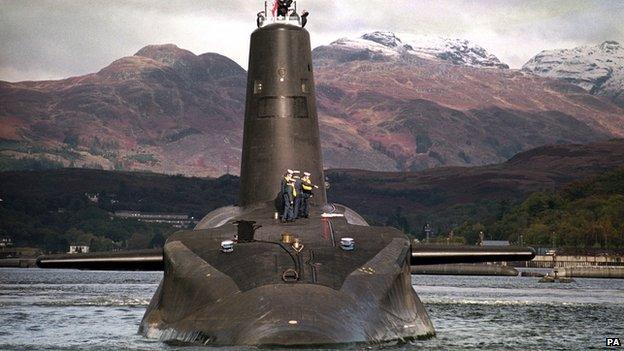
The future of the Trident nuclear weapons programme is in doubt
Defence of the realm is often cited as the first duty of government.
Yet in this election, it is way down the list of priorities for most political parties.
Philip Hammond, himself a former defence secretary, has been reported as saying recently that "there are no votes in defence".
He does not recognise the quote, but the sentiment is largely borne out by the opinion polls which show defence just scrapes into the top 10 of electorate concerns, way behind the economy, the NHS and immigration.

The Army has lost 20,000 personnel
UK military interventions in Iraq, Afghanistan and Libya may have also contributed to a sense of combat fatigue among the public and a reticence by politicians to focus on the subject.
James de Waal, a senior fellow at independent think tank Chatham House, says in this campaign, politicians have been "on the defensive on defence".

To find out Labour and Conservative policies on the subject you will have to persevere to page 77 of both their manifestos.
Even then they are pretty short on detail and do not really address the difficult decisions the next government is likely to face.
So to help, here is a guide to some of the more sensitive issues being left out.
Armed forces shrinking
Most analysts, and politicians, agree the world is becoming more dangerous and unstable, whether that is shown by thousands of migrants fleeing so-called failed states, the threat from Islamic extremism, or a more belligerent Russia.
Yet at the same time, most European nations, including the UK, have been making significant cuts to their armed forces.
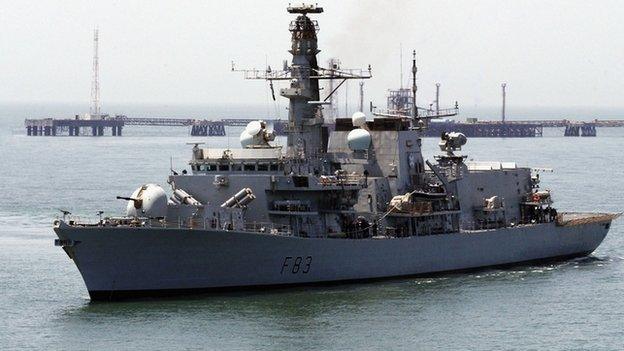
The Navy has a fleet of 19 warships
The size of the UK's regular Army is being reduced from 102,000 to 82,000.
You could fit that number in Wembley Stadium and still have seats to spare.
The Royal Navy now has a fleet of just 19 warships, while the RAF has been left with eight - soon to be seven - front-line fast jet squadrons.
There are some things the UK military can no longer do - so-called capability gaps.
The UK has no Maritime Patrol Aircraft. It has to rely on its Nato allies to hunt for Russian submarines near or in its waters.
At the start of the last parliament, David Cameron could boast that the UK was the fourth biggest spender on defence in the world.
Now, according to the Stockholm International Research Institute, external, the UK has fallen to sixth place, behind the US, China, Russia, Saudi Arabia and France.

Highest spending on defence:
US: £420bn
China: £123bn
Russia: £57.5bn
Saudi Arabia: £44bn
France: £40bn
UK: £38bn
Germany : £32bn
Japan: £31.8bn
India: £31bn
South Korea: £22bn

No more 2%
A commitment to spend 2% of the nation's wealth, or GDP, on defence is conspicuous by its absence.
Only two smaller parties - UKIP and the Democratic Unionist Party - say they would continue to meet that goal.
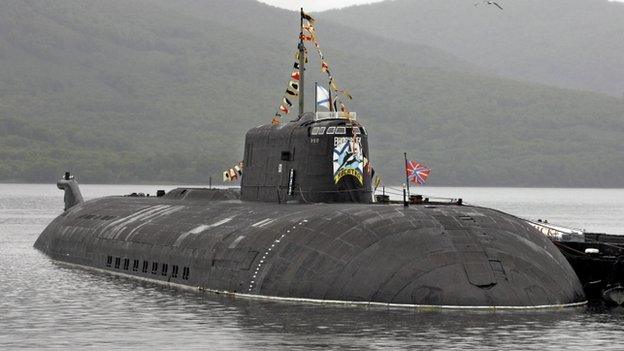
The UK has to rely on Nato to hunt for Russian submarines
But all the indications suggest the UK will soon fall below the Nato threshold.
Malcolm Chalmers, of the defence think tank Royal United Services Institute, says on current projections, UK defence spending will fall to 1.7% by the end of the decade.
If there are more cuts it could fall to 1.5%.
He calculates that defence would require another £25bn over the next five years to stay above 2%.
The military top brass know that is not going to happen.
Their planning assumptions are based on flat spending plus an annual increase of 1% in the equipment budget.
Spending 2% is not mandatory to Nato membership.
Few states do, but it is totemic.
The US will inevitably think less of a key ally that no longer lives up to that commitment, especially when David Cameron recently lectured others on the need to increase defence spending at the Nato summit in Wales.
In US eyes, the UK's credibility will inevitably suffer if, as seems likely, it fails to meet the 2% target.
More cuts
It is more than likely that any future government will have to make more cuts in defence.
The question is by how much?
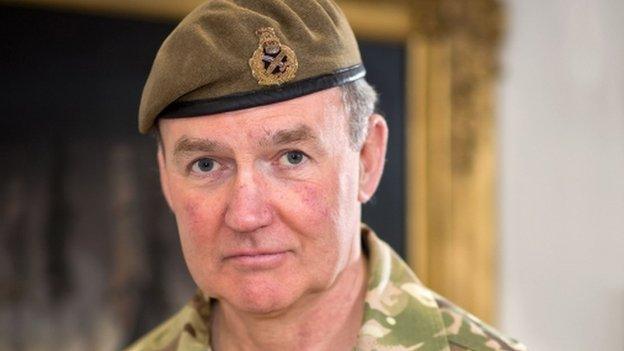
Sir Nicholas Houghton has warned of a "hollow force"
Over the lifetime of the last parliament, the Ministry of Defence (MoD) cut its budget by about 8%.
With the Conservatives, Labour, and the Lib Dems promising to bring down the budget deficit, there will have to be more savings in public spending.
None of these three parties say they would ring-fence or protect defence, like the NHS or overseas aid.
The MoD has reason to be nervous - it has the second largest non-protected budget, after welfare, of £34bn a year.
Another Conservative-led government plans to make savings of around £12bn a year.
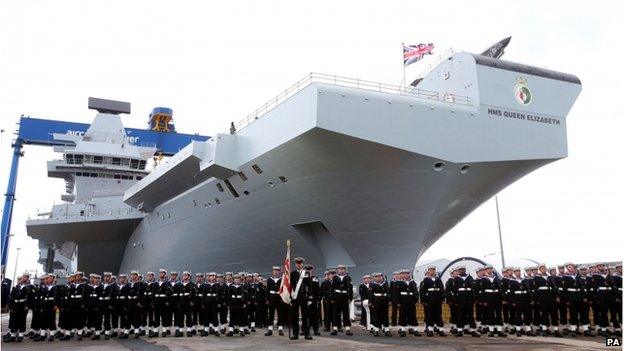
HMS Queen Elizabeth is the first of two new Royal Navy aircraft carriers being built
Shared across the board that could mean the MoD losing at least another £2bn-£3bn of its annual budget.
But Michael Clark, director of defence think tank Rusi, says most of the political parties appear to be backing away from further big cuts, in part because UKIP has made defence an issue during the campaign.
The Conservatives also appear to have limited their options.
They are promising to replace Trident, to increase the defence equipment budget by 1% a year, and to make no further cuts to the size of the regular army.
Mr Clark says those commitments will make it hard to find "significant savings" in defence.
But without raiding the MoD's coffers, he says, the Conservatives' entire fiscal plans would "go out of the window".
Labour has been careful to avoid making similar commitments.
Military chiefs, though, are still worried.
Gen Sir Richard Shirreff, who was the second most senior military commander at Nato, says: " I fear it's almost certain that there will be more cuts."
Trident
The Conservatives and UKIP are committed to renewing Britain's nuclear deterrent with a like-for-like replacement.
That means building four new submarines at an estimated cost of at least £20bn.
According to the MoD's own figures, about one quarter of committed defence equipment spending over the next decade will be on the successor submarines and deterrent systems.
So it is an obvious area to look for savings.
Labour say they would continue the round-the-clock patrols, known as Continuous At Sea Deterrent, external (CASD), but will look at whether that can be done with three rather than four submarines.
The Liberal Democrats say they would retain a nuclear deterrent, but end CASD - what has been dubbed a "part-time deterrent".
The SNP and the Greens would scrap it altogether.
There is no political consensus.
James de Waal, who worked in the MoD on the last Strategic Defence Review, external says: "Trident might be up for grabs."
It is worth remembering the Tories went into the last election committed to renewing Trident, but as part of the coalition deal with the Liberal Democrats, postponed the decision.
What is to prevent another review and another delay, especially if a party like the SNP holds the balance of power?
Paul Ingram, who heads the British American Security Information Council, says the nuclear programme will have to be included in the next Strategic Defence Review, due after the election.
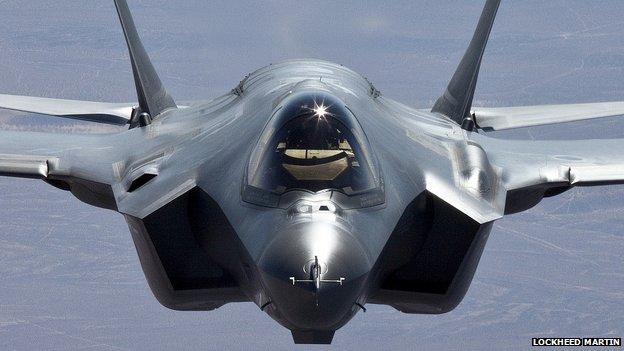
The F-35 is the world's most expensive weapons project
Not least because he says the US will find it hard to stomach a key ally spending all that money on the nuclear programme, if it means contemplating further cuts to the UK's conventional forces.
By the end of this decade, after a gap of 10 years, the UK will have two new operational aircraft carriers.
The Queen Elizabeth and the Prince of Wales will be the largest warships ever built for the Royal Navy.
They should be a symbol of power and of global ambition.
But there is a danger that they will be more like the emperor's new clothes.
On current manning levels, the Royal Navy will struggle to crew both carriers, even if as planned only one of them is operational at any given time.
Plans to equip them with the new F-35 jet, have already had to be scaled down.
There is space on board for 36 F-35s, but current plans are to sail with just 12.
The current chief of the defence staff, Gen Sir Nicholas Houghton, has already warned of the dangers of a "hollow force" with "exquisite equipment" but not enough people.
Politicians have long boasted that in military terms Britain can punch above its weight on the world stage.
But it's becoming harder to live up to that rhetoric.